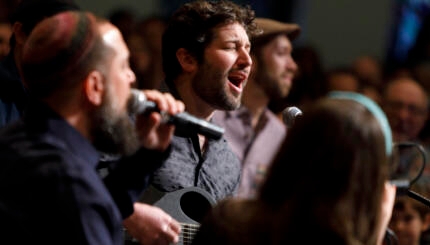Be honest. What’s the very first thing you do in the morning? Hit the snooze button? Check email? Head straight for the coffee?
Unless you’re a real morning person, getting out of a warm bed and starting your day is tough to do. And this is specifically why there is a prayer to be recited at the very moment we wake up, before we do or say anything else.
מוֹדֶה אֲנִי לְפָנֶיךָ מלך חַי וְקַיָּם שֶהֶחֱזַרְתָּ בִּי נִשְׁמָתִי בְחֶמְלָה, רַבָּה אֱמוּנָתֶךָ
Modeh ani l’fanecha, melech chai v’kayam, shehechezarta bi nishmati b’chemla, raba emunatecha
I thank You, living and enduring King, for You have graciously returned my soul within me. Great is Your faithfulness.
Most translations render Modeh Ani as some version of “I thank you.” And rightly so. There’s a concept in Jewish mysticism that sleep is 1/60 of death. We are by no means guaranteed to wake up in the morning, so when we do, it’s only proper that we take a moment to express gratitude for another day, for another opportunity to live our lives. It’s both ironic and unfortunate that so many of us groan in annoyance that we have to get up, without recognizing the incredible blessing that we are able to.
The wording of Modeh Ani also offers a powerful lesson. Grammatically, it would be correct to say Ani modeh — “I thank You.” Yet, the words are in the reverse order, which translates literally as “Thank You, I.” The point is that the very first word that comes out of our mouths should be one of gratitude. We often spend the rest of our waking day focused on ourselves, our needs, our work. So we want to ensure that we never forget to have the foundation of our day be “Thank You.” Only after that has been said, do we mention ourselves.

Help us keep Jewish knowledge accessible to millions of people around the world.
Your donation to My Jewish Learning fuels endless journeys of Jewish discovery. With your help, My Jewish Learning can continue to provide nonstop opportunities for learning, connection and growth.
But Modeh Ani is about much more than gratitude. The word modeh can mean “thank,” but it can also mean “admit” or “surrender.”
Thank is clearly about gratitude. Our lives are gifts. And another day means another opportunity to figure out why we are here and what we are supposed to be doing.
Admit is the acknowledgment and verbalization of our gratitude. When we take an honest look at ourselves, we must admit that we have made mistakes. Nonetheless, we were given another chance to transform our reality. Often we allow our past to determine our present: If we messed up yesterday, chances are today we will again. With that mindset, it’s hard to motivate to even try. The opposite approach is problematic as well: If yesterday was amazingly positive and productive, we may rest on our laurels and fail to take responsibility for making today even better.
This is why the Hebrew word for the past, avar, shares the same root as aveira, which means “sin.” Living in the past, relying on the past, focusing on the past, whether good or bad, is unhealthy. Our focus needs to be on the present, on today. So we begin the day with the admission that no matter who we have been up until now, today is a new opportunity to be that much more.
Surrender is the recognition that there is something bigger than us, that the same God who gave us life is the God who takes it away. And until the morning comes when we are not gifted with another day, we want to ensure we never take for granted the day we are now blessed with.
Only after we thank, admit and surrender can we can focus on ourselves — who we are, what we are capable of, and who we want to be. And with this in mind and on our lips, we can get out of bed and start our day ready for the new opportunities that await us.
Sara Esther Crispe is a writer, motivational speaker, and life and relationships coach. She is the founder of LuminStory.org and co-director of Interinclusion, an educational non-profit celebrating the convergence between contemporary arts and sciences and timeless Jewish wisdom. She lives with her family in Danby, Vermont, where they run experiential Jewish retreats.



